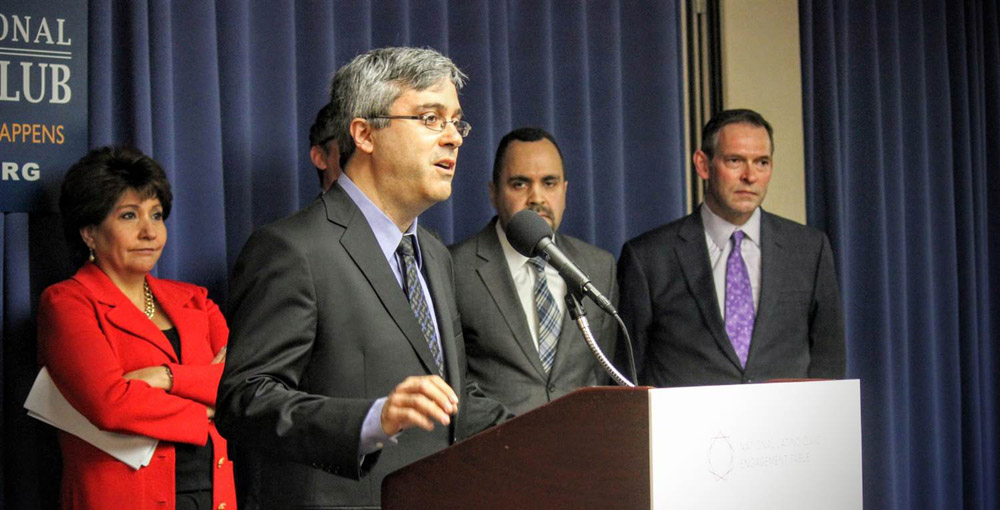Mexican American Legal Defense Fund Today

By Raul A. Reyes and Geraldine Cols Azócar
Mexican American Legal Defense Fund Today
What’s it like to head up a Latino legal advocacy group amid President Donald Trump’s recent policies and others he’s promised to implement? Thomas A. Saenz, president and general counsel of the Mexican American Legal Defense and Educational Fund (MALDEF) spoke with NBC Latino about everything from the ICE raids in immigrant communities to Supreme Court nominee Neil Gorsuch.
Saenz stated that the waves of immigration enforcement actions around the country are likely to result in legal challenges.
“I think there will be lots of litigation about what is going on, not just now but certainly in the future,” he said. “The executive orders themselves are legally problematic, particularly as they’re implemented.”
In Saenz’s view, constitutional protections against unlawful search and seizure could be used as a basis for trying to challenge future actions by Immigration and Customs Enforcement.
MALDEF has taken a stand on one aspect of Trump’s new deportation policies, the decision to expand the use of 287(g) programs. These partnerships allow local law enforcement officials to serve, in effect, as immigration agents in their communities.
“While (DHS head) Kelly terms such agreements a ‘force multiplier’, what they really multiply is liability,” Saenz said in a statement.
“Joining a ‘force’ that is uncontrolled in following a directive that virtually everyone is a priority — yielding authority to the whims and biases of agents nationwide — is an invitation that all responsible local officials should reject.” Such agreements sow community mistrust and division, Saenz explained, while burdening localities with costs of potential litigation and liability. MALDEF has called upon local governments to reject existing or potential 287(g) agreements, as Harris County, Texas recently did.
Although Latinos and other minority groups have historically turned to the courts to guarantee their full civil rights, Saenz is realistic about the road ahead.
“The federal government is going to withdraw from enforcing civil rights probably entirely,” he said. In some cases, he foresees the federal government possibly switching positions in cases they are already involved in, to take an anti-civil rights stance. In addition to immigration enforcement, he predicted future court battles over voting rights, labor rights, education, redistricting, and reproductive rights.
A graduate of Yale University and Yale Law School, Saenz’ career at MALDEF has spanned myriad notable cases. In the 1990s, he worked on the successful legal challenge against California’s Proposition 187, a measure which would have barred undocumented immigrants from accessing state services.
More recently, Saenz argued in support of President Obama’s executive action on immigration before the Supreme Court in 2016. His group is currently part of a lawsuit that alleges Wells Fargo illegally denied student loans to young people based on their immigration status.
While MALDEF is currently conducting an assessment of Supreme Court nominee Neil Gorsuch’s record, Saenz told NBC that, “there are some troubling indications in his (Gorsuch’s) history.”
In weighing the Gorsuch nomination, the fact that he was nominated for a seat that many believe belonged to Merrick Garland, President Obama’s pick for the high court, and questions about Gorsuch’s familiarity with the Latino community are important factors to Saenz.
Of Mexican-American heritage, Saenz cites his parents’ commitment to community service and activism as his inspiration. He also admires the accomplishments of Supreme Court Justice Thurgood Marshall, civil rights activist and lawyer Charles Hamilton Houston, and former MALDEF president Vilma Martinez.
In the Trump era, Saenz acknowledged that civil rights groups face “an increasing amount of work to be done.”
“I think it is clear that the Trump Administration is a step backwards. It is almost in the phrase that he (Trump) used to get himself elected, Make America Great Again – as though it was better before when civil rights were not as developed as they are today,” Saenz said.
“I don’t think it is a permanent step back. I think that in particular the Latino community will bounce back; that we will be in the lead of changing government once more.” He points to the state of California as emblematic of how Latinos became politically active, energized, and organized in response to anti-immigrant measures like Proposition 187.
“I think we’ll see that on a nation-wide level, and we’ll see it beginning very quickly,” Saenz added. “So I am concerned about this setback – but I don’t think it is a permanent one by any means.”
Source: NBC News














